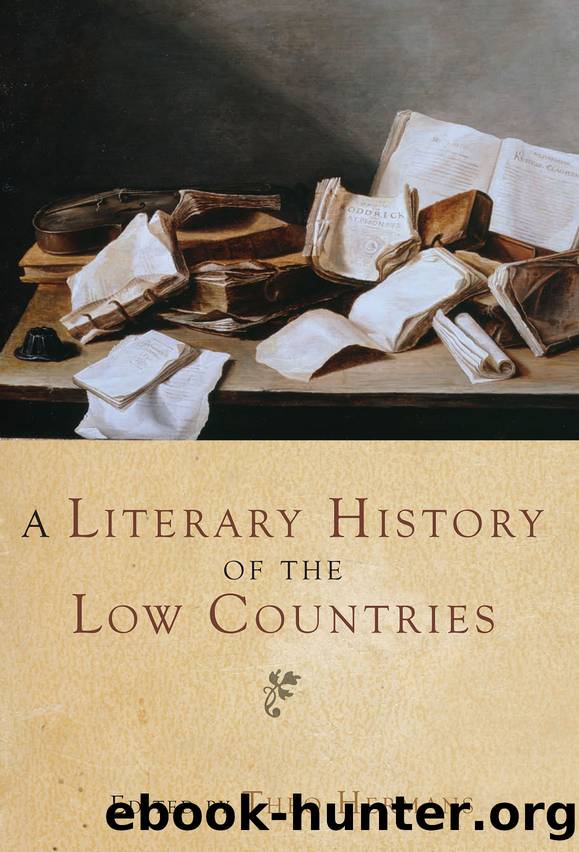Literary History of the Low Countries by Hermans Theo;

Author:Hermans, Theo;
Language: eng
Format: epub
ISBN: 9781571137449
Publisher: Boydell & Brewer Group Ltd
Published: 2013-04-17T16:00:00+00:00
The Epistolary Novel and the Sentimental Novel
In the final quarter of the eighteenth century the novel was reinvented once more, and in such a way that even established literary critics ceased to be hostile. Whereas the entire genre had previously been vilified for the immoral character of many adventure novels, the new novel won praise for its ethical nature. This was the epistolary novel, entirely different in form and character from existing popular prose. The experiences of ordinary, decent citizens became the main subject of the epistolary novel, and exciting plots were of secondary concern. The thoughts, feelings, and psychological make-up of the characters came to the fore, and the letter-writing format meant they could be described in exhaustive detail. This shift from adventure to psychology enabled the new novel to develop into a pedagogical instrument.
Dutch readers, like readers elsewhere in Europe, discovered the epistolary novel through the work of Samuel Richardson. Pamela (1740–41) was translated immediately, in 1741, and reviews appeared in French periodicals published in the Netherlands. Clarissa (1748) followed in 1752–53, translated by the Baptist minister Joannes Stinstra, who added an enthusiastic preface to each volume. At the end of the eighteenth century, in a preface to the 1797 second edition of the translation of Charles Grandison (1753–54), it was Johannes Lublink’s turn to write admiringly, “Each letter is a spectatorial expostulation upon itself. What wealth of insights into human nature, of invention, of judgment, can we not sense here?”
The message communicated by most epistolary novels can be summed up in the simple phrase “think before you act.” This meant seeking an equilibrium between reason and emotion and stressing the importance of a well-balanced upbringing. In most epistolary novels the protagonist had been denied such an upbringing. Like other popular prose, these novels introduced orphans or semi-orphans to demonstrate that the lack of a proper upbringing was one of the reasons people might go astray as adults.
How better to demonstrate such a derailment than through a love story? Here, more than anywhere else in literature, emotions were given free rein. Infatuation could place young men and women in unpleasant situations. Take Sara, the central character in the first and best-known Dutch epistolary novel, The History of Miss Sara Burgerhart (De Historie van mejuffrouw Sara Burgerhart, 1782) by Elisabeth Wolff and Agatha Deken. After the death of her parents, Sara finds herself in the hidebound milieu of her aunt, Miss Zuzanna Hofland, a narrow-minded, bigoted woman who has allied herself to a conservative current within Protestantism called “the fine,” a movement with a generally bleak outlook on life that set great store by inner religious experience. Sara is young, cheerful, and determined to enjoy herself. The two characters inevitably collide. After a ferocious argument Sara runs away, is offered bed and board by the jolly widow Mrs. Spilgoed, and abandons herself to luxury and pleasure. This is the mood in which she meets Mr. R., a rake. A naive girl, Sara initially responds to his advances but comes to her senses in time to escape a planned rape and preserve her chastity.
Download
This site does not store any files on its server. We only index and link to content provided by other sites. Please contact the content providers to delete copyright contents if any and email us, we'll remove relevant links or contents immediately.
The Fine Print (Dreamland Billionaires Book 1) by Lauren Asher(2403)
Fury of Magnus by Graham McNeill(2364)
The Last House on Needless Street by Catriona Ward(2189)
The Rose Code by Kate Quinn(2087)
Malibu Rising by Taylor Jenkins Reid(1813)
Luster by Raven Leilani(1803)
Transcendent Kingdom by Yaa Gyasi(1772)
A Little Life: A Novel by Hanya Yanagihara(1771)
Moonflower Murders by Anthony Horowitz(1732)
The God of the Woods by Liz Moore(1582)
The Lost Book of the White (The Eldest Curses) by Cassandra Clare & Wesley Chu(1523)
This Changes Everything by Unknown(1425)
The Midwife Murders by James Patterson & Richard Dilallo(1382)
The Lying Life of Adults by Elena Ferrante(1353)
The New Wilderness by Diane Cook(1343)
Written in the Stars by Alexandria Bellefleur(1322)
Wandering in Strange Lands by Morgan Jerkins(1287)
Ambition and Desire: The Dangerous Life of Josephine Bonaparte by Kate Williams(1284)
The Lying Life of Adults by Elena Ferrante;(1237)
